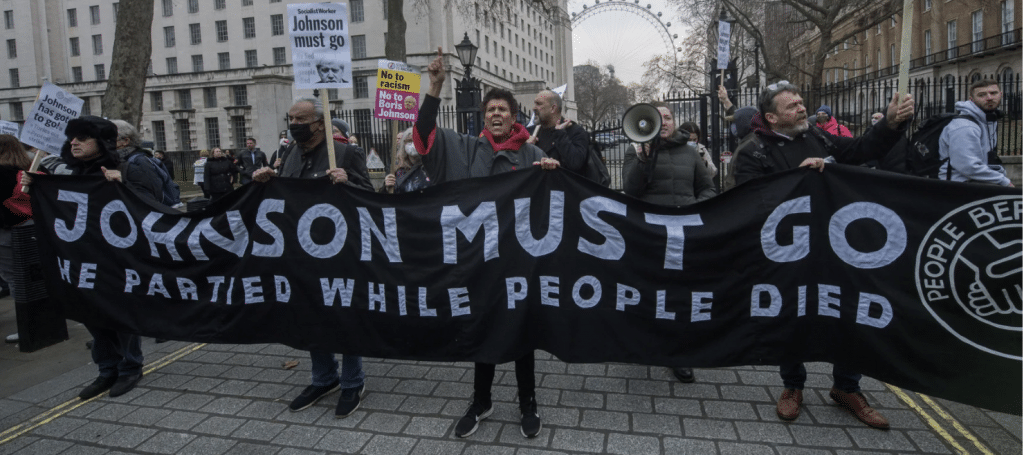It has been a crisis-filled few weeks in UK politics. On the one hand, the symbolic head-of-state Queen Elizabeth II has been dealing with the increasingly inescapable fact that her son, Prince Andrew, is a rapist who was involved in Jeffrey Epstein’s pedophile ring. On the other hand, Prime Minister Boris Johnson’s position is increasingly tenuous as public and political outcry about a string of parties that he and his aides threw during strict Covid-19 lockdowns grows. Recent polls are showing that even many Brexit supporters — a significant portion of Johnson’s base — want him to resign. But why is it “partygate,” of all things, that seems to pose the biggest threat to bring down Johnson’s scandal-ridden premiership?
To answer that question, it is important to position these parties in context. A damning timeline from the Guardian positions the dates of these parties side by side with the numbers of daily Covid-19 deaths, highlighting that, on a day in May 2020 where the PM held a gathering of 17 people in his garden, 421 people died of Covid-19. To make matters even worse, the specific lockdown rules at that time banned all gatherings except for outdoor socially distanced ones featuring no more than one person from outside the household. Given that, Johnson’s “wine and cheese” garden party with 17 others is a clear violation of that policy. Five days later, over 100 staffers were invited to a “Bring Your Own Booze” party in the garden of 10 Downing Street — which doubles as the Prime Minister’s offices and Johnson’s home. 353 people died that day, while 100 government staffers and Johnson drank and made merry.
To add insult to injury, Johnson and his cronies also violated the strict lockdown policy during Christmas 2020. A Covid-19 spike in the weeks leading up to that Christmas led to the imposition of “Tier 4” rules for the holiday season on many areas — including London, where Johnson’s parties took place. Tier 4 regulations ban “household mixing, aside from support bubbles and two people meeting in public outdoor spaces.” These restrictions taking effect for the holiday season meant that it was functionally illegal for many working people to see their families and, in some cases, their partners.
Meanwhile, however, Johnson and the Conservatives were throwing multiple in-door Christmas parties. A leaked video features Johnson’s aides laughing about how there was “definitely” no social distancing at a Downing Street Christmas party. The day that party is believed to have taken place, 596 people died of Covid-19 in the UK. Parties were also held by members of the Department of Education, the Conservative Party Headquarters, the Department of Transport, and the Cabinet Office.
To put this bluntly: while working people across the UK were isolated, lonely, sick, and dying, the Prime Minister and his allies were behaving as if the rules didn’t apply to them.
This is why “partygate” has become the straw that broke the camel’s back, despite the government’s multitude of scandals in their handling of the coronavirus pandemic. Johnson wasted millions of pounds on a botched track-and-trace scheme that “failed its main objective” and oversaw the implementation of comically absurd guidelines — rules like only being able to drink at a pub if you also ordered a meal. Indeed, studies seem to suggest that Johnson’s “Eat Out to Help Out” campaign to get people to go out for meals led to a spike in Covid-19. More recently, Johnson refused to impose new restrictions for Omicron in England — despite the fact that Wales, Scotland, and Northern Ireland (which controls its own Covid-19 policies) imposed new policies to combat the spread of Omicron. Across the board, Johnson’s record on Covid-19 has been an unmitigated failure.
Johnson is a disgrace and has no place in government. However, in denouncing Johnson, his government, and his total disregard for Covid-19 restrictions, we must be careful to not offer political support to his chief political rival: Labour Party leader Sir Keir Starmer.
Starmer, who was knighted by the Queen for his services as a prosecutor, is – at least symbolically – the second coming of Tony Blair, in terms of politics, not in terms of charisma or electoral success. Taking over the party from the more left-wing Jeremy Corbyn, Starmer has been tireless in his attempts to shift the party to the right. From suspending Corbyn to keeping the party Left out of the shadow cabinet, to changing party rules to ensure that the rank-and-file members of Labour have less say over choosing the next leader (a clear attempt to prevent another Corbyn), to purging leftists from Labour’s ranks, Starmer’s leadership has been a right-wing one. We should have no illusions that he will govern the UK – if he is ever successful in securing the premiership – to serve the working masses.
Neither Johnson nor Starmer have the solutions to the crises facing the UK right now. Neither man can resolve the Covid-19 crisis. Neither can resolve the crises of Brexit. Neither have solutions to shoring up the National Health Service nor solutions to the faltering economy. Only the organized working class, with their own political leadership, can do that. And, for all of their imagery and performative red flags, Keir Starmer’s Labour Party is not that party.











